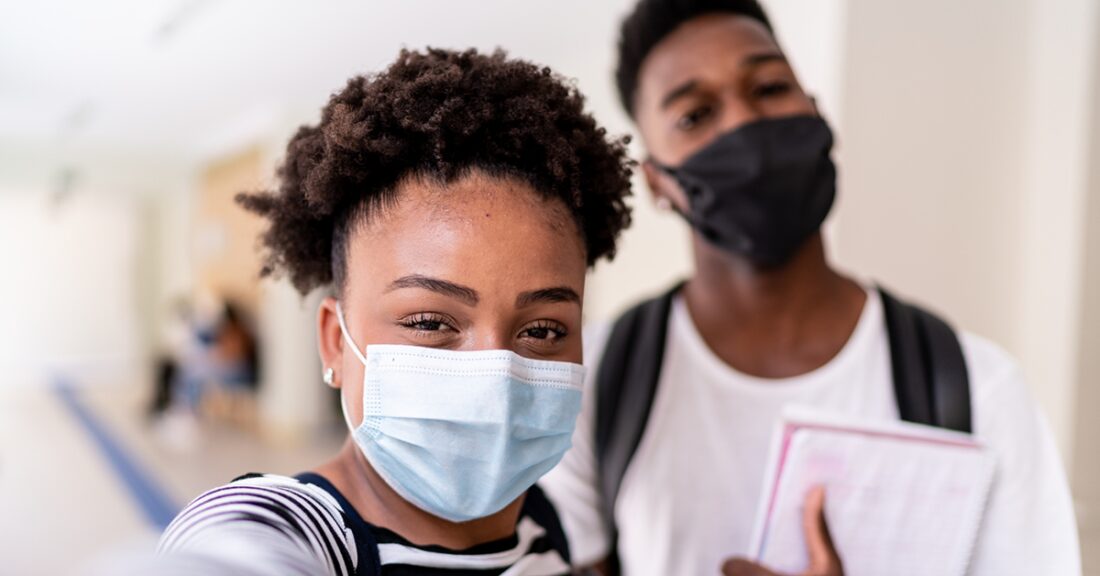Preparing High School Students for Careers During and After the Pandemic

Insights from a Pandemic: Reflections from the On Track to Career Success Project is a new brief from Johns Hopkins University’s Everyone Graduates Center. It reflects on the deployment of On Track to Career Success (OTC), a new framework for ensuring all students are prepared for successful careers after graduation. OTCS was designed and implemented in Albuquerque, New Mexico, and New Orleans, Louisiana, with support from the Annie E. Casey Foundation. Everyone Graduates launched the program in 2020 as part of the Foundation’s Thrive by 25® efforts to support young adults ages 14 through 24.
Preparing High School Students for Career Success
The OTCS framework is an evidence-based model designed to guide high school students as they prepare for future career success. The New Mexico and Louisiana schools chosen to employ the framework serve Black and Indigenous students, often in low-income communities that were hit hardest by the pandemic. Learn more about the negative impact of COVID-19 on education.
The framework is built on three elements:
- Milestones. OTCS uses college and career milestones to determine if a student is on track to succeed in the workforce. Each school community is responsible for creating its own version of these milestones, which focus on social-emotional development and academic progress. Reaching these milestones indicates that a student has been prepared to succeed in postsecondary education and careers.
- Monitoring student success. OTCS also closely follows indicators of student success in grades 9–12 to ensure student progress toward high school graduation and postsecondary preparation. These indicators include school attendance, student behavior and academic performance.
- Connections that lead to career success. The framework’s goal is to ensure students take part in work and educational experiences that build toward a career. OTCS brings together school, community and employer partners to connect students with college visits and work-based learning opportunities.
Key Insights From OTCS’ Implementation
Five valuable lessons surfaced during the framework’s implementation amid the COVID-19 pandemic:
- Human connection is critical to learning. Schools found that the mental — and even physical health of staff and students — deteriorated due to the learning interruptions created by the pandemic, demonstrating how important social-emotional well-being is to academic success.
- Stop and listen to grow equity. Everyone Graduates found that the pandemic required the implementation team to slow down and listen to a variety of voices to create an equitable growth strategy. This included exercises such as empathy interviews among school staff to create greater awareness of the challenges each school faces.
- Flexibility is essential to overcoming obstacles. The pandemic and its resulting challenges demonstrated the need for flexible and responsive leadership, partnerships and team structures. During the implementation of the framework, partners dealt with insufficient capacity, shifts in learning and shortened semesters. The Robert F. Kennedy Charter School — an OTCS partner in Albuquerque — used flexibility to manage the competing priorities caused by the pandemic by adjusting the pace and focus of projects as needed.
- Creating and sustaining partnerships requires continuous effort. Everyone Graduates observed that partnerships require in-person engagement and a shared context. This was difficult to accomplish given the pandemic, which effectively ended face-to-face meetings and led to new communication issues.
- Develop new solutions for today’s obstacles. Given the unprecedented nature of the pandemic, schools and districts were encouraged to develop and share new ideas and solutions.
“The struggles students faced during the COVID-19 pandemic — including increased social isolation and disconnection from school — demonstrate the importance of a framework like On Track to Career Success, which provides a practical way of monitoring student engagement,” says Ilene Berman, director of the Casey Foundation’s Evidence-Based Practice Group. “Schools and community partners play an important role in ensuring young people are prepared for adulthood. Through this framework, they can become active participants in the college and career preparation of each student.”
Next Steps and Challenges
Although the OTCS framework presents students and schools with a road map to pursue careers after high school, plenty of challenges lie ahead. As school districts continue to recover from the disruptions to learning and mental wellness caused by the pandemic, they must combat increases in absenteeism, shore up school and partner capacity and work to address lower post-secondary education enrollment rates.
To do this, OTCS schools in New Mexico and Louisiana will develop targeted, grade-level milestones, engage with student design teams to provide feedback on the approach and develop new strategies with community partners to ensure students get the engaging experiences they need to succeed in college and the workplace.
“With the return of in-person learning, OTCS schools and their staff have new questions to consider when it comes to student engagement,” says Allison Gerber, director of the Casey Foundation’s Education, Employment and Training division. “Using the lessons they learned during the pandemic and their experiences with the OTCS framework, our partners are prepared to ensure their students stay engaged and on the road to successful careers.”
Learn how to develop supportive connections for young people.






